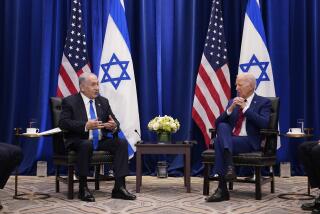Syria Summit Necessary for Peace, Rabin Says
- Share via
JERUSALEM — Israeli Prime Minister Yitzhak Rabin, assessing his country’s negotiations with its Arab neighbors, said Monday that a summit with Syrian President Hafez Assad would be necessary to conclude a peace treaty with Damascus.
Although the two countries’ diplomats were progressing in their talks in Washington, this was essentially a “ground-clearing” effort to clarify fundamental issues, and Rabin said that only he and Assad could deal with those.
“Without involvement of the top political echelon of another country and of Israel in the efforts to bring about peace, I doubt if peace is attainable,” Rabin said.
Rabin said that only through such direct discussions would he and Assad be able “to convince the Syrian people and the Israeli people that here is a readiness . . . to end the war and establish a real peace, a peace that the man in the street will call peace.”
In interviews broadcast Monday on state-run radio to mark Rosh Hashanah, the Jewish new year, Rabin gave Syria a clear priority in Israel’s negotiations with its Arab neighbors, including Palestinians living on the West Bank and in the Gaza Strip.
“The key is in the hands of the Syrians because Israel was never opposed to contacts at the highest political levels,” he said.
But Rabin acknowledged that, far from an agreement with Assad, “I can’t say at this moment, based on what I know, that this is a realistic possibility.”
Israeli Foreign Minister Shimon Peres, however, has been trying to open a channel to Syria outside the U.S.-mediated talks in what Western diplomats see as a potential shortcut to such a summit.
“If he wanted, Hafez Assad could, the next time Roland Dumas (the French foreign minister) comes to Damascus, simply suggest that he is ready for such a meeting, and everything would be fixed in two days with a minimum of conditions and protocol,” a senior Western diplomat said.
The negotiations between Israel and Syria are stalled over Israel’s reluctance to cede occupied territory and by Syria’s reluctance to make what Israel regards as a complete peace.
More to Read
Sign up for Essential California
The most important California stories and recommendations in your inbox every morning.
You may occasionally receive promotional content from the Los Angeles Times.













